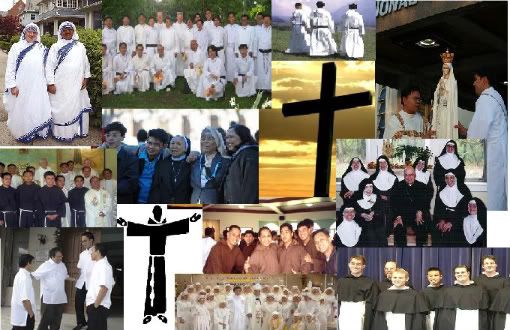Advantages of Religious Life
Within the limits of a small pamphlet it would be impossible to give even an outline of the advantages of the religious state, and the heavenly favors enjoyed by those who are called to such a life. “What a glorious kingdom of the Holy Ghost is the religious state!” writes Father Meschler, S.J. “It is like an island of peace and calm in the middle of the fleeting, changing, restless flood of this earthly life. It is like a garden planted by God and blessed with the fat of the land and the dew of heavenly consolation. It is like a lofty mountains where the last echoes of this world are still, and the first sounds of the blessed eternity are heard. What peace, what happiness, purity and holiness has it shed over the face of the earth.”
Nor is this to be wondered at, since God is never outdone in generosity, rewarding the sacrifices made in obedience to His call with a lavish hand.
Peter said to Him: “Behold, we have left all things, and have followed Thee: what, therefore, shall we have?” And Jesus said to them: “You shall receive a hundred-fold and possess life everlasting.”
“Taste and see how sweet the Lord is,” says the Psalmist, for only those who have experience of the happiness, peace and contentment of the cloister realize fully the truth of the Savior’s words: “Mary hath chosen the better part.” The present writer could quote the heartfelt words of gratitude to God from many a soul for the grace of their vocation. One who had to suffer much in breaking the ties which bound her to the world and home, writes: “I seem to be slowly awakening from a long dream. I am so very happy I do not know if I am myself or some one else. How can I ever thank God enough for bringing me here?”
St. Jerome compares religious, who have left the world, to the Israelites delivered from the bondage of Egypt, and says God has shown great love for them in exchanging their hard slavery for the sweet liberty of the children of God.
A. Its Happiness
Many caricatures have been painted of monks and nuns, depicting them as a merry, jovial crew, rejoicing in the good things of this world, but no artist has ever yet drawn a religious community as a collection of sad-faced, melancholy beings. The very atmosphere of a convent is joy and tranquility, its inmates bright and cheerful; for, safe from the storms and troubles of the world and the insatiable desire for wealth, free from the cares, the anxieties, of a home and family, protected by the mantle of a loving charity from the disputes, the quarrels and petty jealousies of life, they have at last found true happiness, which consists in peace of soul and contentment of heart.
The world may boast of many things, but it cannot claim to give happiness to its followers. One who had the means of gratifying every craving, Solomon, sadly exclaimed: “Whatsoever my heart desired, I refused them not, and I withheld not my heart from enjoying every pleasure, but I saw in all things only vanity and vexation of spirit, except to love God and serve Him alone.”
The life of a religious, like that of every other human being, must be a warfare to the end; they have their crosses and tribulations, and God, in order to sanctify them, often sends great trials and interior sufferings, yet through it all, deep down in the soul they feel the presence of Christ’s most precious gift: “My peace I leave you, My peace I give you,” that peace of heart, “a continual feast,” which the world knows not of, nor can earthly pleasures bestow.
Hence St. Lawrence Justinian says: “Almighty God has designedly concealed the happiness of religious life, because if it were known all will relinquish the world and fly to religion.”
“An earthly Paradise,” says St. Mary Magdalen of Pazzi; and St. Scholastica, “If men knew the peace which religious enjoy in retirement, the entire world would become one great convent.”
Secure in the possession of God, rejoicing in the promise of a glorious eternity, is it any wonder that those who left all to follow Christ should find “His yoke sweet and His burden light”? The writer of Recit d’une Sœur sums up well this picture of true religious life in these words: “Happiness in heaven purchased by happiness on earth.”
B. Its Holiness
Spiritual writers say that life in religion surpasses all others, because it removes obstacles to perfection and consecrates one, in the most perfect manner, to God. The world, with its round of amusements and distractions is the deadly enemy of piety, and even the best disposed persons find it hard not to be influenced by the prevailing spirit of indifference to spiritual things, or unaffected by so much careless, if not downright evil, example around them. Many a holy soul hungers for prayer and recollection, only to find that the cares of a family, the calls of social duties, the unavoidable visits and entertainment, encroach far on the limited time they can give to God.
In religion, on the other hand, care of the soul is the first and most important duty, its advancement and perfection the great business of life.
By a wise economy of time, religious, in spite of many other occupations, can devote four or five hours a day to meditation, prayer, visits to the Blessed Sacrament, and the recitation of the Office, so well distributed that no burden is felt.
His Rules and the voice of Obedience make known to him the Will of God, which he could never be certain of in the world; they protect him from a multitude of dangerous temptation, shutting out in great measure the possibility of sin; the company of so many chosen souls, their generous example and saintly lives, spur him on to nobler things; saved from all worldly anxieties, he can give his whole heart to the service and love of God, leading a life which is an earnest, if humble, imitation of his Lord and Master Jesus Christ.
“O Lord,” cries out holy David, “a single day in Thy house is worth a thousand in the courts of sinners.” “I hold it for certain,” says St. Alphonsus, “that the greatest number of the vacant thrones of the fallen Seraphim will be occupied by souls sanctified in the religious state. Among the sixty persons canonized during the last century there were only five who did not belong to religious orders.”
C. “The Triple Cord” –The Vows
But that which constitute the essence of religious life, and give to it such merit, is the observance of the three vows of Evangelical Perfection – Poverty, Chastity and Obedience. A vow is a solemn promise made to God, after serious deliberation and having fully grasped its responsibilities, by which the soul engages to perform something, under pain of sin, which is better to do than to omit.
It is certain that it is more perfect and more agreeable to God to do a good work, after having obliged ourselves to do it by vow, than to do it freely without this obligation. For, as St. Thomas says, an act of perfect virtue is always of itself more excellent than that of a lesser virtue. Thus, an act of charity is more meritorious than an act of mortification, since charity is a more perfect virtue than the virtue of penance. After the theological virtues of Faith, Hope and Charity, the most perfect of all is the virtue of Religion, by which we worship God; a vow is an act of this the noblest of all the moral virtues, the Virtue of Religion, and by it all the actions performed in virtue of the vows are elevated to the dignity of acts of religion, giving them not only much greater value in the eyes of God and imparting to the will constancy and firmness in well-doing, but immensely increasing the holiness of the person, since from each action he reaps a double reward, the merit of the act of virtue, and the merit of the act of religion, imparted by the vow.
Of all the vows that can be made, the three of the religious state are the noblest and the best. The perfection of a Christian consists in renouncing the cupidities of life, in trampling on the world, in breaking all ties that hold him captive, and in being bound and united to God by perfect charity. The three great obstacles that prevent him from acquiring this perfection are, according to St. John, the concupiscence of the eyes for riches, the concupiscence of the flesh for the pleasure of the senses, and the pride of life for seeking after honours. The vow of poverty destroys the first, the vow of chastity the second, and that of obedience the third.
By these vows man makes of himself a perfect sacrifice to God, he offers himself as a holocaust to His glory, surrendering into His hands, for ever, not only all earthly possessions that he has or might have, but even gives up his liberty and will, the most perfect immolation a human being can make.
Seeing how pleasing is this lifelong sacrifice to God, the Fathers of the Church, St. Jerome, St. Bernard, the Angelic Doctor and many others, have always called religious profession a “Second Baptism”, by which the guilt and punishment due for past sins is entirely remitted.
“A religious lives more happily and dies more confidently,” wrote St. Bernard; and well he may, for he knows that the three vows which bound him forever to the service of his Master have washed away all trace of a sinful past, that the evil deeds of his life, be they as numerous as the sands on the seashore, with all the dreadful consequences they brought with them, have been blotted out by the recording angel, and that his soul is as pure and spotless as when first the waters of baptism made him the heir of heaven: “Greater love than this no man hath,” said the Saviour, “that a man lay down his life for his friends,” and, adds the Apostle: “Charity (the love of God) covereth a multitude of sins.” By the daily crucifixion of his life, the religious makes this offering of all that is dear to him into the hands of his Friend and Master, a martyrdom far more painful than that of blood, but one which he knows will win for him a glorious crown.
One can easily understand, then, the determination of those who for one reason or another have been obliged to leave a religious house to enter again. Disappointment, delays, even refusal, seem but to increase their longing to give themselves to God, for they have learned in the convent the beauty and grandeur of a life which is “All Jesus”, they have tasted their sweetness and realized the possibilities of immense holiness within its walls, and, like Isabella of France, who refused the hand of the Emperor Frederick to become a humble nun, they exclaim: “A spouse of Jesus Christ is far more than even an Empress.”








